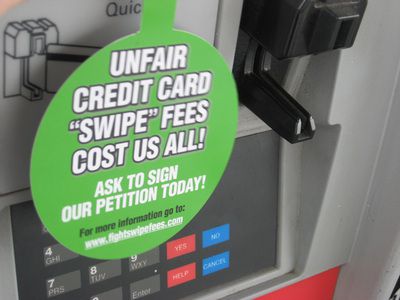These signs have started sprouting at the pumps of some area gas stations. What’s it all about? It’s an attempt by the companies to get Congress involved in the credit card company practice of charging merchants every time a credit card purchase is processed.
The companies are making more money off the fees now that recent card card reform in Washington has limited some of the profits from high interest rates and fees charged to people who carry a balance.
Robert Shapiro, a former Clinton administration advisor and author of a study on swipe fees wrote on Forbes.com in February that the credit card legislation should’ve included limits on “swipe fees.”
While free market competition tends to drive prices down, the kind of cartel-like competition that goes on between the handful of major credit card companies–Visa, MasterCard, American Express and Discover account for 85% of the market–drives up these fees. The credit card companies recruit banks to their networks by promising them higher fees paid by consumers and merchants, and the banks try to attract new, well-to-do subscribers by offering rewards that are then financed through these fees. All of these costs are hidden from consumers.
“Credit card fees are hidden to our customers and have increased at a double-digit annual compound growth rate during the past decade,” Tony Kenney, the head of SuperAmerica Speedway said.
Shapiro’s “report” said without the fees, up to 250,000 jobs could be created. Not everyone is buying that, including Mike Duff, writing on BNET.
Besides the inherently dubious nature of the assertion that X amount of money translates into Y number of jobs, the retailers ignore the other side of the transaction. To wit: If banks are deprived of profiting from credit-card transactions, which is what the study bases its numbers on, how many bank jobs will be lost?
The retail organizations face other problems if they want the government to intervene with the credit-card industry. First, the government is propping up the banking system. Taking money out of the finance system, as in reduction of credit card fees, could mean money out of the U.S. treasury system.
Plus there’s the philosophical question in the wake of recent health care and banking legislation: Is there a compelling public interest for Congress to intervene? Or is it a matter between private businesses?

